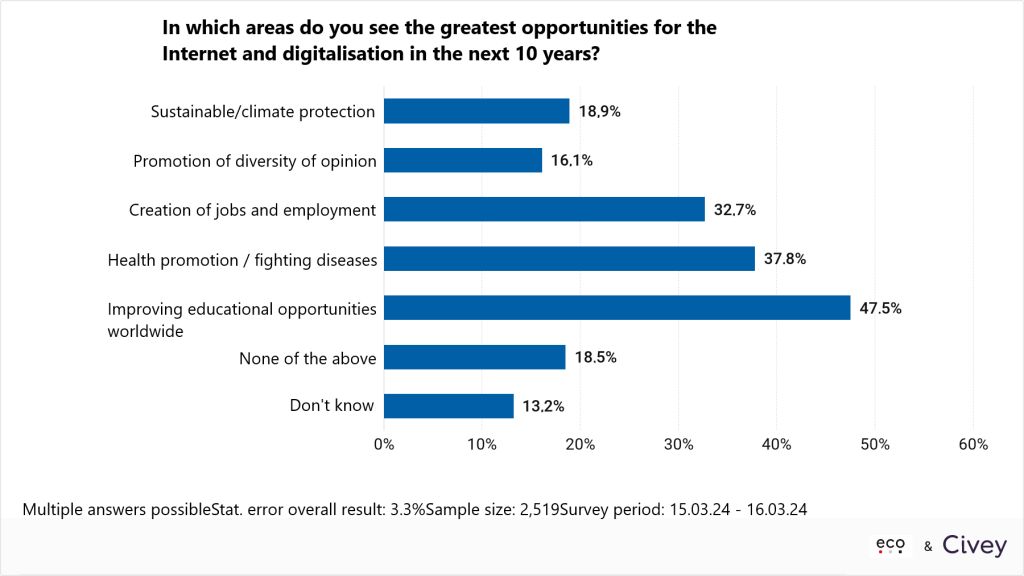- 5 per cent of respondents say the Internet can improve educational opportunities worldwide
- eco Association calls for continuation of the German Digital Pact for Schools
Digital services and technologies already offer great potential for addressing pressing global challenges. People in Germany see particularly strong potential in the education and health sectors, according to a representative survey of the population conducted by the market and opinion research institute Civey on behalf of eco – Association of the Internet Industry. 47.5% of respondents believe that the Internet will improve educational opportunities worldwide in the next 10 years. 37.8% expect positive effects on health promotion, while around 33% of Germans also expect advancing digitalisation to create additional jobs.
The majority of respondents are of the view that not only developing and emerging countries can profit immensely from the opportunities offered by digitalisation in the education sector, but that Germany also has a significant need for catch-up in the education and health sectors when it comes to digital transformation.
Despite Germans recognising the importance of digital education, the further financing of the German Digital Pact for Schools, which expires in May 2024, has not yet been secured – despite the contrary stipulations of the coalition government in its coalition agreement.
“We now need swift clarification of the financing for a new Digital Pact for Schools,” says eco Managing Director Alexander Rabe. The German federal government’s current strategy of watering down its commitment to the Digital Pact by attaching financing to partly new conditions and delegating responsibility to the federal states runs counter to the intention of finding pragmatic solutions in the field of digitalisation in the education sector.
Rabe calls for the financing of the Digital Pact to be maintained at the same level and, above all, to be implemented quickly and unbureaucratically.
“The nationwide development of a digital education infrastructure in Germany is fundamental for securing the innovative capacity of the German economy and the long-term provision of suitable skilled workers.”
Ensuring participation in digital education
IT skills and the basics of computer science need to be taught across the board, while devices also need to be procured. However, digitalisation also entails matters such as teacher training. “We need regular training for teachers in dealing with digital technologies and in the design of didactic concepts for digital education. What is also needed is the establishment of reliable learning platforms in order to ensure participation and access to digital education across the board,” Rabe goes on to say.
eco – Association of the Internet Industry calls on the German federal and state governments to act now. The education of children and adolescents must include the basics of programming, as well as the role and function of algorithms and data literacy. Computer science must become a compulsory subject in the curricula of all general education schools. In addition, didactic concepts of computer science and digital education must be introduced across the board in German schools to ensure that responsible and ethically justifiable decisions in dealing with digital technologies and applications are guaranteed in the future.





